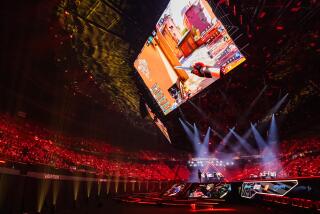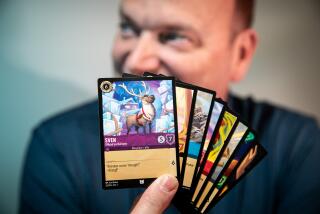Dealing in Magic : Fantasy Card Tournament Draws World’s Best-Known Players
- Share via
Frank Gilson was going for broke in the competition Friday. Literally.
An unemployed 28-year-old with a degree in mathematical behavioral science, Gilson was banking on the success of his team, the Pacific Coast Legends, at this weekend’s international fantasy card tournament in Long Beach to supplement his meager income from dealing in the game cards.
At stake was more for him than just the $130,000 purse to be divided Sunday. The Legends are also searching for a professional sponsor. A strong showing against 184 of the world’s best-known players could be just the thing.
To prepare, the Legends have conducted multiple computer analyses of how this weekend’s games might play out, and Gilson estimates he spends about 50% of his waking thought on mastering Magic: The Gathering.
The game, something of a common ground between fantasy role-playing and bridge, has claimed the imaginations of hundreds of thousands of enthusiasts like Gilson. Players use elaborate designed cards to cast spells or summon creatures to wreak havoc on their opponents, who must try to defend their “life count.”
Appearances are important too. Players strutted around the competition room on the Queen Mary with shirts that advertised their local game shop or gaming club. One donned lion slippers, while another sported a black derby and cape.
Though most popular among computer and math types, the pastime is spanning the globe and can now be played in at least seven languages. Praised by game critics as the new wave in fantasy games, it has spurred dozens of copycats.
Indeed, says Magic creator Richard Garfield, a 32-year-old former math teacher, the game has found a niche.
Comfortable in his oversized black coat, wrinkled shirt and Bugs Bunny tie, Garfield is the stereotypical interactive intellectual. His eyes darted around the room nervously as he took a break from supervising the competition to discuss the game’s popularity.
Magic’s biggest draw, he says, is adaptability. With about 1,500 different cards, concentrating on just one strategy spells doom for the advanced player, he said.
Adaptability is certainly a winning strategy for the game’s manufacturer, Seattle-based Wizards of the Coast. The company has kept players’ attention with five “expansion sets,” each of which includes 200 or more new spells and creatures to be summoned.
The buzz among spectators Friday was the imminent release of the new expansion deck, dubbed Alliances. Each competitor will receive a free deck Sunday, which otherwise won’t be available for months.
Of course, rumors about the new set are all over the Internet. Although they couldn’t recognize each other, many of this weekend’s competitors swap strategies over their modems.
During the first match Friday, one competitor’s prestige on the Internet created something of a fuss as he squared off against another well-known player, Frenchman Bertrand Lestree.
|Palo Alto native Brian Weissman’s widely discussed defense strategy has recently won him accolades from fellow players, so spectators and representatives of the media gathered around when they learned that he had been randomly paired up with Lestree, who took second place at a competition in New York in February.
In the end, an experimental change in tournament rules determined the match. The tournament was the biggest yet in which players were forced to select their cards from a standard deck circulated among eight other players. Usually players build strategies around a deck of their own construction.
The stronger hand was evident from the first of three games, all of which Weissman quickly won. Although Lestree threatened with a “fire-breathing flier,” he had nothing to defend with when Weissman played a fissure card, which engulfed Lestree’s last hope--a cemetery gate.
Gilson did not immediately know how his Legends team members were doing, but he was upbeat about his own first match victory. Even so, he says there’s more to life than just playing the game. “The rest of the time,” he says, “I spend thinking about it.”
More to Read
The biggest entertainment stories
Get our big stories about Hollywood, film, television, music, arts, culture and more right in your inbox as soon as they publish.
You may occasionally receive promotional content from the Los Angeles Times.










